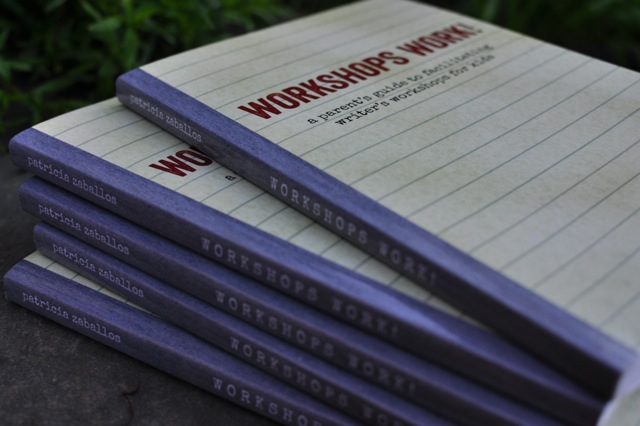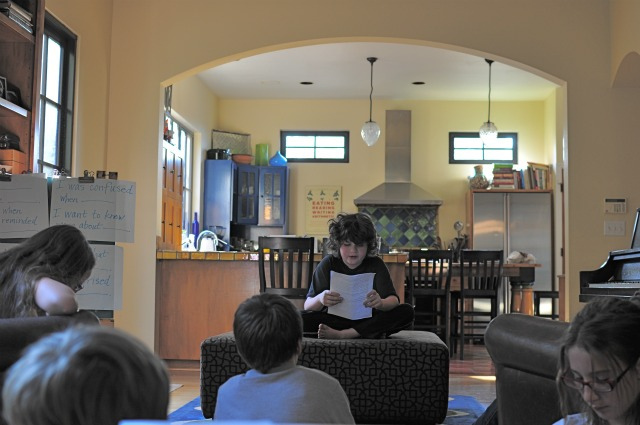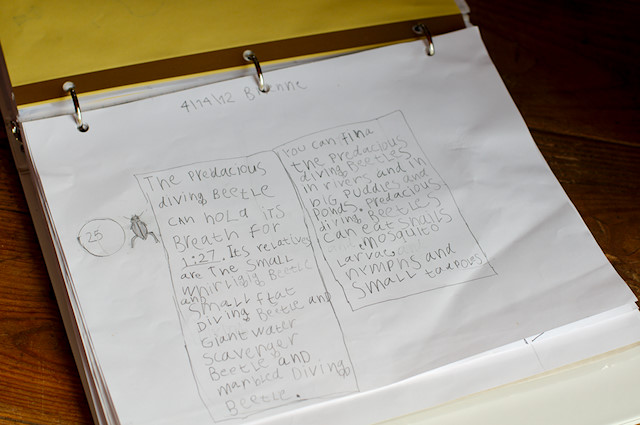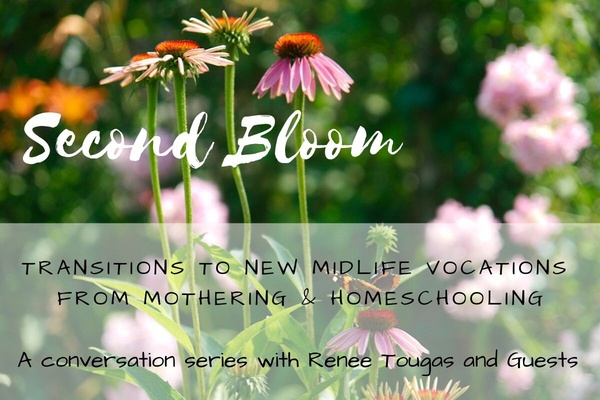Get posts by email
Homeschool Writing with Patricia Zaballos
March 11, 2013
You are going to love the interview I have for you today!
Writing is a "subject" that stresses out many homeschool parents and kids. I get a lot of questions on the blog and in coaching sessions about writing, usually along these lines, "My kids' don't like to write. What do I do?"
I prefer an interest-led, everyday communication approach to writing instruction. In brief, writing to communicate student-motivated thoughts and ideas. But I have my moments of doubt when I think I should be "requiring" more and that my kids should be "producing" more writing. In these moments of doubt I look to those who have gone before me for wisdom and support. I look to homeschool parents like Patricia Zaballos.

Patricia is an educator, a homeschool parent and writer. She recently published a book called Workshops Work! which is all about creating an audience for your child's writing in the form of a writer's workshop.
Patricia has years of experience facilitating writer's workshops for kids. She has taken that wisdom, plus her personal story as a homeschooling mother of three, and written a fabulous how-to manual for those of us new to writer's workshops. Her book Workshops Work! walks us through the entire process, providing a whole toolkit of ideas, examples, and anecdotes to get us going.
I reviewed Patricia book before publication and I am so happy to recommend it to you as an excellent resource in your homeschool toolkit.

Today I'm interviewing Patricia a bit about her book but also about writing in general.
What I really want to know is how can we teach our children to write without all the angst that often accompanies it?
Let's talk to Patricia and find out.
~~~
Patricia, you're a homeschooling mom. How many kids do you have and how old? Have you always homeschooled? If no, when did you make the switch?
My kids are 20, 17 and 11. We homeschooled from the start. I'd been an elementary teacher before that, and I became intrigued with the possibilities of learning outside the confines of a classroom. My oldest homeschooled until he was sixteen, and then decided to go to high school for two years. He is now a junior in college, studying film production. My daughter homeschooled until she was fourteen, and then decided to go to high school as a freshman. She's now a junior. My youngest is still homeschooling.
As you probably know many homeschoolers fret a lot about writing. Your book addresses one very real solution to this - creating a writer's workshop to provide a supportive peer group and audience for our children's writing. What other advice can you give homeschool parents about how to teach writing to our kids?
I think we often misunderstand how kids really learn to write. School experiences have convinced us that writing is something that must be taught; I would argue that learning to write should not be so very different from learning to talk. It can happen quite naturally and painlessly if we allow it to evolve on its own timetable.

Many parents underestimate how much kids learn to write simply by reading and being read to. Kids who grow up in literature-rich homes naturally develop expansive vocabularies. They seem to pick up how literature works by osmosis, especially if they are allowed to dwell in books and genres that interest them. It's especially useful if families talk about books and stories and films together, so kids can develop opinions and insights about what they like and dislike in literature.
Along those lines, kids learn to write simply by talking. If they grow up in homes where ideas are discussed and debated, where their own ideas are valued, those kids learn how to speak clearly, logically and enthusiastically. That will absolutely carry over into their writing, eventually. I have talked to many, many homeschooling parents of kids who did very little writing in their younger years, yet who somehow magically developed into writers as teenagers. It isn't magic that does it; it's the fact that the kids grew up in literate homes in which the kids' ideas were valued. All the reading and talk of childhood can transition into writing without too much difficulty if it isn't forced.
Of course, the more kids write, the better they will get at it. One of the most important things parents can do is help kids find authentic, exciting reasons to write. By authentic, I mean writing for a real purpose, rather than writing because a parent or teacher has assigned it. It can be a challenge to find real writing formats that excite a kid.

The best place to start is the child's interests. I can't tell you how many parents I've talked to whose kids became enthusiastic about writing for the first time in order to chat online while playing Minecraft! Look for opportunities like that, and don't underestimate their value, even if the writing looks sloppy, error-riddled and unacademic. Once kids understand the power of making words work for them, they will want to keep doing it, and will get better at it.
I wrote a longer article about these ideas called How Do Kids Really Learn to Write? It gives several examples of authentic writing possibilities, based on kids' interests.
(And yes, writer's workshops are one of the best writing motivators I know!)

We parents can do more damage than good if we do too much "teaching" when it comes to writing. Our teaching is likely to be based on our school experiences with writing--and most of us did not receive good, useful writing instruction in school. That's why most adults are self-conscious about their writing abilities!
Most writers will tell you that they had to overcome and forget what they learned in school in order to learn to write well. Kids who grow up in literate homes develop excellent instincts about writing. Don't muck that up! Rather than teaching too much, we should be providing excellent models of writing for our kids: good books on topics that interest them. Then, if we help our kids find authentic reasons to write, those opportunities will provide organic, real reasons to get better at writing.
You have a son in college. What advice can you share with us about preparing our kids for college writing? Many of us (ok, maybe just me) despair that our children will never be ready for college writing and we are tempted to use methods we're not comfortable with just to "see results".

Honestly, I think we should worry less about preparing our kids, and do whatever we can to help them enjoy writing right now. Kids who find a writing forum that they enjoy will dig into it. They will learn what it means to tinker with words, to move them and change them until the words express what the kids are trying to say. It doesn't matter if they develop this expertise by writing longwinded fantasy stories, or reviews on video game forums. Kids who know how to manipulate words for their own purposes will be able to take on any writing format that gets thrown at them by the time they're of college age.
There may be a small learning curve, but they will adapt because they understand how to work with words. Also, they know the joy of saying just what they want to say in writing! On the other hand, kids who are marched through a bunch of writing formulas and formats may never really learn to make words work for them. If the required writing doesn't matter to them, they will put their energy into guessing at what the teacher or parent wants--not what they want to say. They won't learn to write well.
One of my favorite writing encouragements comes from writer and college English professor Thomas Newkirk:
"The good writers I see in college have often developed their skill in self-sponsored projects like journals or epic, book-length adventure stories they wrote on their own." Our task as parents really ought to be helping our kids find those self-sponsored projects!

Rather than pushing formal essays on kids, we can expose them to wonderful nonfiction writing on topics that interest them. If they like sports, find excellent sports writing; if they enjoy music, films or videogames, search out well-written reviews on those topics. Just the other day I saw an anthology of the best writing in mathematics! There's something for everyone. If you find nonfiction that your child enjoys, talk to him or her about it. Find out what they like and dislike about it. Help them develop opinions about which writers are their favorites and why. (This is all essay-writing practice, even if it feels like casual conversation!) After reading for a while, kids may feel inspired to try writing similar nonfiction their own. Emulating one's writing heroes is one of the best ways to learn to write.
Teens might enjoy taking part in a research paper workshop, in person with other kids, or online. You could use the book The Curious Researcher, by Bruce Ballenger, as a guide. This is a college-level text, but it could easily be adapted for teenagers. Older versions of the text are quite affordable. I like this guide because it encourages students to write a paper based on a personal interest, and it helps them hone in on their questions and curiosities about the topic, and to structure the writing around those questions. It teaches them to think like writers, and to write work that is both academic and engaging. Hallelujah! Teenagers could meet regularly to discuss and share their work in progress, adapting the text to their needs. Such a workshop would probably be best facilitated by an adult, but eager teenagers might be able to do it on their own.
Any last words of advice or wisdom about writing for parents just starting out with homeschooling?
Try not to worry so much about teaching writing, and instead take up writing yourself! Find a forum that excites you: a blog, a personal journal, even your Facebook updates. Dabble in poetry if you like it, or write about your kids. Consider taking a writing class, or finding a writing group, if that sounds exciting to you. I wrote more about this on my blog. If you experience the joys and frustrations of writing yourself, you will be able to offer better writing advice to your kids. It won't be based on your schooling; it will be based on your real writing experiences. It will be useful.
~~~
I loved what Patricia shared with us here. Thank you Patricia!
This was a long post (and if you are a homeschooling parent I do recommend you read it all) and if you need a recap I've pulled the important points out for you. More homeschoolers need to hear the freedom of this message.
- Learning to write should not be so very different from learning to talk. It can happen quite naturally and painlessly if we allow it to evolve on its own timetable. If (kids) grow up in homes where ideas are discussed and debated, where their own ideas are valued, those kids learn how to speak clearly, logically and enthusiastically. That will absolutely carry over into their writing, eventually.
- One of the most important things parents can do is help kids find authentic, exciting reasons to write.
- Kids who know how to manipulate words for their own purposes will be able to take on any writing format that gets thrown at them by the time they're of college age.
- Try not to worry so much about teaching writing, and instead take up writing yourself!

Patricia has a great homeschool blog and make sure to check out her book Workshops Work! Do you want to inspire and support meaningful writing in your homeschool? Consider the role of writer's workshops for kids and use Patricia's book as your guide.
Filed Under
Resource Library
-

debbie on March 11, 2013, 6:30 p.m.
Thanks for the nudge about this book - I've had it on my wishlist since it came out, as I always appreciate the insights Patricia has on her blog! Mostly I love the encouragement about letting kids come to writing on their own, without the drudgery of forced writing - I've seen that work in my 10 year old, and know that 7 is on her way, with her rich vocabulary and her love of telling stories...
-

Kim on March 11, 2013, 11:57 p.m.
I had this book on my wish list and received it for Christmas. I will be digging in soon. Thanks for the great interview.
-

Dawn Suzette on March 12, 2013, 3:02 a.m.
I loved Patricia's book and I am always eager to soak up her wisdom. Thanks for the great interview.
-

DL on March 12, 2013, 1:56 p.m.
I would heartily agree with Patricia's point on the blessing of providing great literature and an atmosphere where reading and writing are encouraged and modeled. My husband and I homeschooled our three children through the end of high school. Both of our sons use their writing skills in their jobs with great success and my youngest son has already had two novels published. Neither of them have gone to college nor felt the college experience necessary to hone their writing skills. In today's world where so many writing opportunities and resources are so easily available, the writer can always be finding methods to hone their craft.
-

renee on March 12, 2013, 7:05 p.m.
DL, thank you so much for sharing this with us. I love this.
-
-

Kika on March 13, 2013, 1:33 a.m.
I was interested in purchasing your son's books for my church library but the shipping cost alone would run from $38-$54 using the only two options offered. Perhaps a less expensive option could be considered?
-

Kika on March 15, 2013, 4:55 p.m.
Found them on amazon.ca so free shipping now:)
-
-

DL on March 12, 2013, 10:33 p.m.
Renee: You are so welcome! I recently found your blog and am enjoying listening to your heart very much.
-

Sharonnz on March 13, 2013, 12:22 a.m.
I just bought this book last week and am really excited about giving it a go!
-

Laura on March 13, 2013, 8:30 p.m.
Thank you, Renee and Patricia! Writing is the area that I most often question in our homeschooling. After reading the Brave Writer blog for years, I finally forked over the money for "The Writer's Jungle" and "Help for High School" this year. I have a 10th grader, so I find myself wondering if I am preparing him well enough for college. My husband, who has taken college classes recently, has encouraged me that our children will be fine. I hope so! I just feel so responsible, you know? I want to enjoy these years, as they are flying! But, I want to do my part. Anyway, thank you, for the helpful and encouraging words!
-

renee on March 13, 2013, 8:44 p.m.
I use The Writer's Jungle as my overall guide for homeschool writing instruction. I find the concrete ideas and overarching progression very helpful.
-
-

Kika on March 14, 2013, 7:29 p.m.
Obviously each child is different and some will have an easier time with writing than others but I've followed BraveWriter ideas for years with my kids and used Help for Highschool (we didn't actually work all the way through it) with my oldest and he took the expository essay course which was great. He is only in grade 11 but always aces essays without much effort. I can't see him having any difficulty with writing at a post-secondary level. One of my focuses for academic writing has simply been getting my kids comfortable with writing a basic 5 paragraph essay: presenting ideas clearly, with a strong thesis, supporting arguments, etc. This isn't too hard to teach and yet it seems like so many kids and college students don't have this basic ability.
I think that before grade 8/9, just encouraging my kids to read, discuss ideas, write for pleasure on topics of interest, etc., all helped my son develop in his personal voice and lack of anxiety around writing.
My big kids have enjoyed writing workshops. I am presently organizing our third homeschool writing workshop (I bring in a Christian author for this and this time around his wife, a Nashville recording artist, will also come and offer a song-writing workshop!).
-

renee on March 14, 2013, 7:39 p.m.
Fabulous. What a great approach you have Kika.
-
-

Merrielle on March 16, 2013, 8:54 p.m.
Great! I have a 7 year-old and I was just starting to fret. In general, we believe our children will learn what they see us doing. I believe writing will develop when it develops. But we got another letter from DD's pen-pal and I just got all panicked inside! Am I doing her a dis-service by not making her write!?
This article helped reinforce what I really believe: children are learners.
Thanks!
-

Alaina on March 19, 2013, 2:15 p.m.
This is fabulous, thank you.
I've seen this in my home. I tried to do a typical school type activity of doing "reading response" and it was met with a bad attitude and overly simplistic sentences. But then the same child can write letters and emails to friends and relatives, and write a short story when she wants to without any issues! When she WANTS to write what she is writing it makes a huge difference.
However this is all a little scary in some ways!! I'm still working out how to do all this and find myself often thinking of doing things the way I was taught (in public school).
I don't want to take all the fun out of learning!
You can subscribe to comments on this article using this form.
If you have already commented on this article, you do not need to do this, as you were automatically subscribed.







patricia on March 11, 2013, 2:53 p.m.
Thank you so much for the opportunity to hang out on your blog, Renee! I love seeing all those photos of Brienne and her writing. It's great that she's writing in so many formats!
If you FIMBY readers have any other questions for me, I'm happy to reply here in the comments!